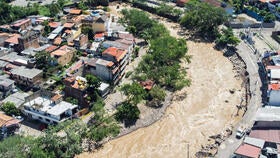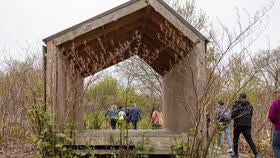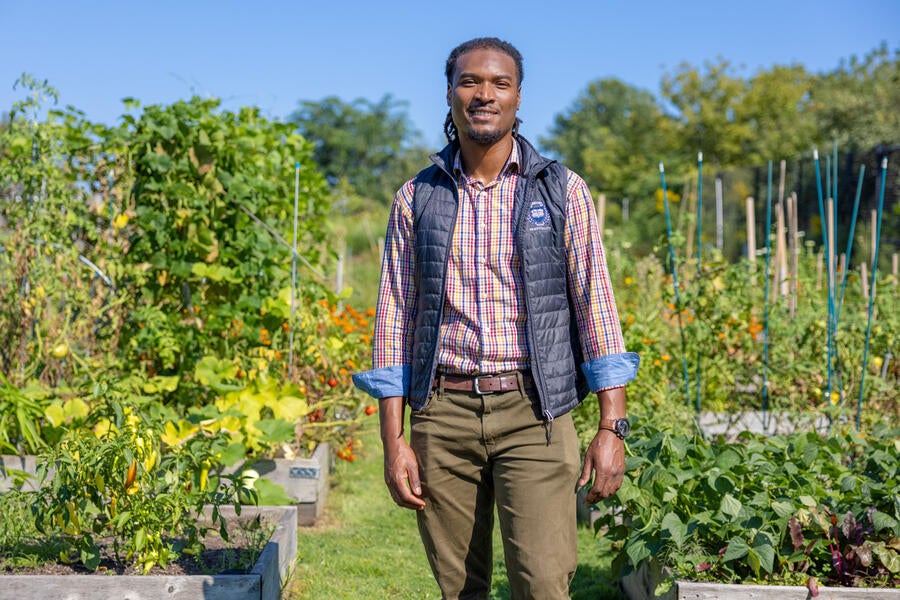
On the Yale West Campus Farm one late summer afternoon, Jordan M. Williams dug his hands deep into the soil of one of the farm’s raised beds. He was searching for potatoes. “It looks like there’s nothing here,” said Williams. “But if I dig a little bit, and remember where I planted them, I will see my potatoes. Hopefully.” At last, he pulled up a knot of Noblesse potatoes, each one the size of a small fist.
Elsewhere, and aboveground, verdant life thrived. Bees and dragonflies (“they’re natural pest control,” Williams noted) buzzed through tomato plants and basil, cucumbers and watermelon vines, lacy passionflowers, and sturdy sunflowers.
Williams, the West Campus Farm and Operations Manager for Yale Hospitality, just finished his first full year of stewarding the farm. In addition to overseeing the quarter-acre farm, which includes a small greenhouse, he manages the Café at the Yale West Campus Conference Center, a central gathering place for those working and studying at West Campus. The dual role allows him insight into the entire food cycle — and the opportunity to foster knowledge and build community through both the cultivation and consumption of sustainably grown produce.
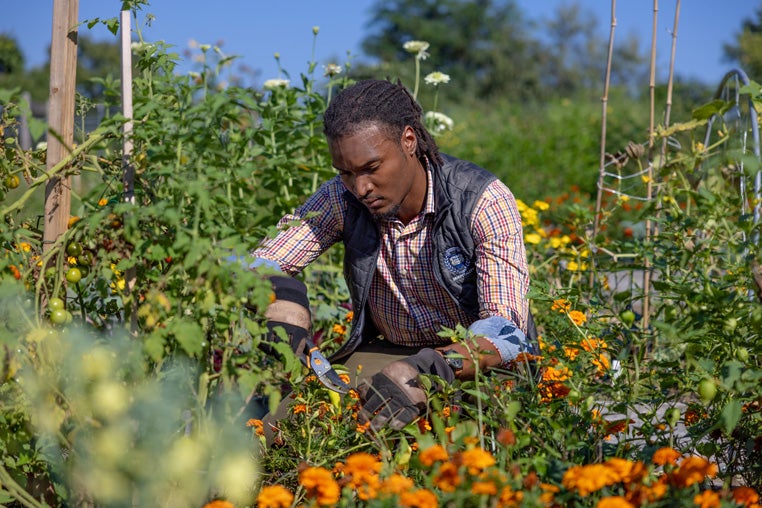 get to know the land.
get to know the land.
Dedicated volunteers
First opened in 2013, the West Campus Farm has long benefited from a strong corps of volunteers among students, staff, researchers, and faculty. Williams looked to further focus their efforts this year by piloting a program to give interested volunteers their own beds to plant, maintain, and harvest.
“I can be a facilitator to whatever people need for this place, whether it be growing their own food, supplementing their nutrition, or having a space to just be for their mental health,” said Williams. Sunitha Nallur, a research lab manager at West Campus, has been involved at the farm off and on since 2015, and was one of the volunteers who took ownership of a bed. “Everybody was so excited to grow whatever they wanted to grow,” she said.
Nallur, who grew up in India, planted tomatoes and peppers, along with yellow cucumbers and Indian broad beans, vegetables more commonly found in South Asia. “Where I live, we have too many deer, and I could not grow anything near my house, so this is really nice for me,” Nallur said.
Building community, trying to create a sustainable relationship between us and the land, and education and learning – tying those three together and making it delicious, that’s the plan, said Williams.
Williams reserves a number of the 44 beds he manages for volunteers. “The goal is to provide space and freedom for volunteers to express themselves, and, if they so choose, to grow plants that have relevance to their own cultures,” he said. In return, he asks that volunteers agree to maintain the farm’s sustainable ethos and avoid the use of pesticides or non-organic fertilizers.
Paul Cavaliere, a carpenter in Yale Facilities who is based at West Campus, took on a bed this year, along with special responsibility for the blueberry patch. “I love blueberries — just a beautiful fruit,” he said. “They’re pretty self-sustainable. I weed a little, I put netting over them, fertilize them.”
Spending his lunch hour at the farm has become a welcome routine and respite. “Even though I’m picking weeds and sweating, it’s an escape,” Cavaliere said. “I’ll pull up a carrot and eat a carrot, have a handful of tomatoes, some blueberries. That’s a snack or even lunch.”
“It’s a wonderful break,” Nallur said. “It’s fun to go and see what everyone else is growing. I didn’t even know there were different kinds of squash. You go there and say, ‘Oh, what is that?’ So many different shapes, different sizes, different varieties.”
The food cycle
Through his first year at the farm, Williams’s brief was simple: get to know the land. “You need to build rapport with a piece of land to know the ebbs and flows,” Williams, who recently was featured as a campus “sustainability champion,” said.
Among the works in progress: an adapted version of the indigenous planting method known as Three Sisters, with okra in the place of corn, black-eyed peas subbing for beans, and cucumbers instead of squash.
Williams has been working on making the farm’s small greenhouse a more welcoming and productive space, mostly by reusing or recycling materials. A path through the greenhouse’s center is defined and cushioned by wood chips that were the byproduct of pruning around campus; the soil level was raised with compost from the recycling center that processes food scraps from the main campus dining halls.
“This is another connection between the farm and hospitality,” said Williams. “People always think about the food and what comes from the farm to the café, but the other side of the feedback loop is what comes from the cafés back to the farm: the compost that adds to the health of the soil.”
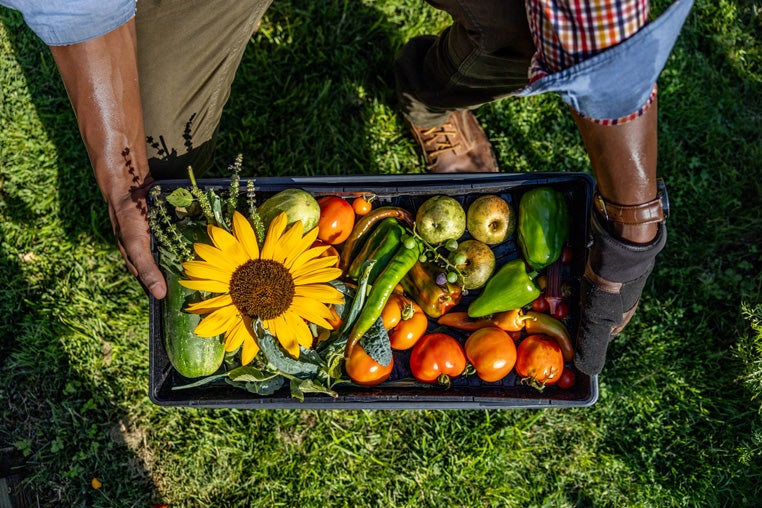 Williams displays some of the food he gathered, including tomatoes, peppers, and cucumbers.
Williams displays some of the food he gathered, including tomatoes, peppers, and cucumbers.
As Williams settles into the seasonal rhythms, he also aims to bring more people out to the farm to enjoy working with the land, learning about its produce, and tasting what it can provide. One integrated event between the West Campus Café and the farm took place over the summer, with a blueberry jam-making tutorial.
Volunteers first harvested berries from the farm’s blueberry bushes and then, led by Cyril Ortigosa-Liaz, a chef at the Yale School of Management, learned how to turn the fruit into jam. Each participant took home a fresh jar of homemade preserves. “It was amazing,” said Nallur, one of the attendees. “The chef was so knowledgeable, and the jar of jam looked like it had been professionally packed.”
Williams hopes to create more of these events throughout the year and to introduce more of the Yale community to the farm, its adjacent 30-acre wooded preserve with walking trails, and the West Campus Café. The farm is open to visitors and volunteers from across campus and has hosted events and tours for organizations such as the Yale Naturopathy Club at the Yale School of Nursing.
The café, which recently extended its menu into the early evening, serves as an essential anchor on West Campus, allowing colleagues from across disciplines to meet formally or casually. And as manager of both the farm and café, Williams can explore new ways to connect community members through food — whether that’s harvesting fresh produce or enjoying a meal together.
“In trying to build community, I try not to impose too much of what I believe it should look like. I want to give people the agency to create their own,” said Williams. “And then we can revitalize this space and make sure that the foundation of what is done is based in sustainability and a permanent agricultural practice — things that are good for us and the environment itself.”
The West Campus Café is open weekdays from 8:00 a.m. to 6:30 p.m., with a menu that changes weekly. Getting there: Visitors may drive to West Campus or take the West Campus Shuttle.
Volunteer hours at the West Campus Farm are held Mondays, Tuesdays, Wednesdays, and Fridays from 2-4 pm, through November. Those interested in reserving a garden bed during the growing season (April-November) or with questions may email Williams.




